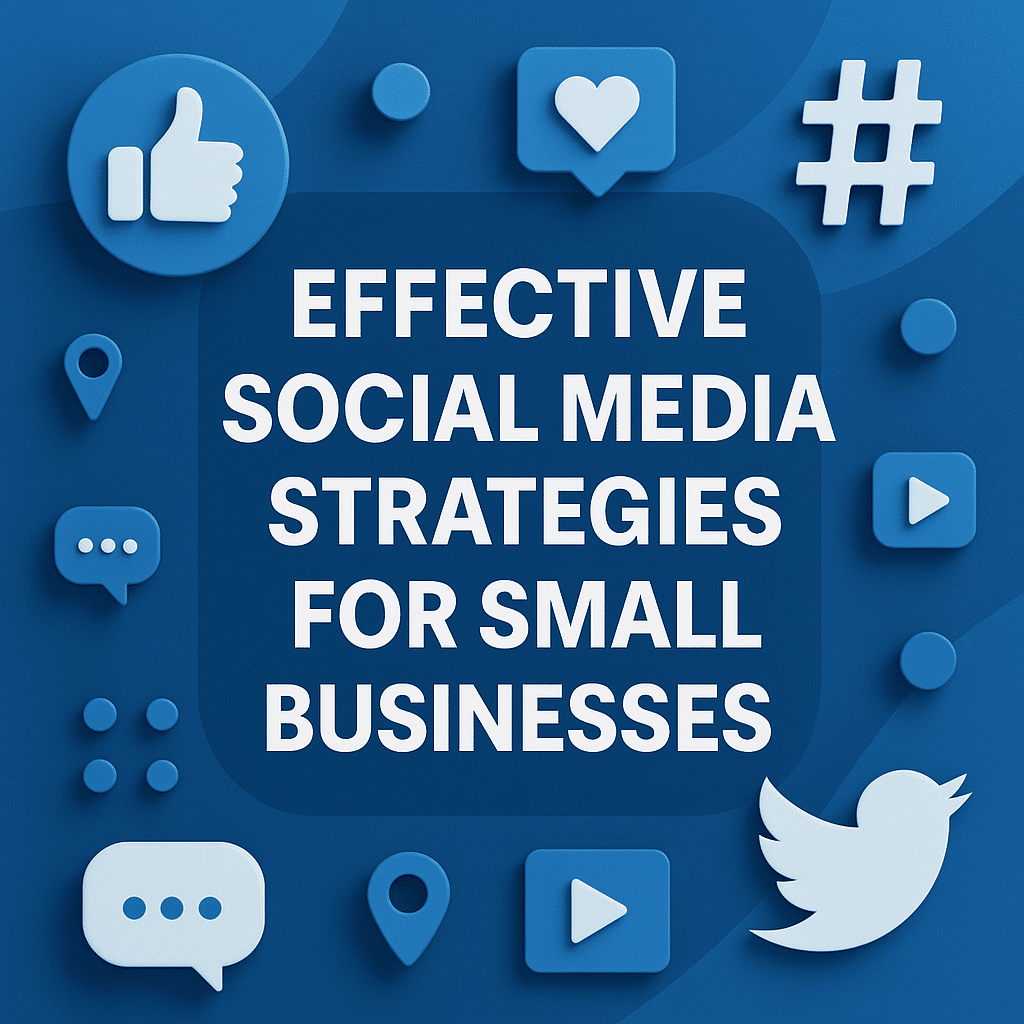Introduction: Effective Social Media Strategies for Small Businesses
In today’s digital economy, building a strong social media presence is no longer optional—it’s a strategic necessity. Effective social media strategies for small businesses can open doors to increased visibility, customer engagement, brand loyalty, and even sales. However, the approach must be thoughtful, data-driven, and tailored to the unique characteristics of small enterprises.
As social platforms continue to evolve, understanding effective social media strategies for small businesses is essential for brands looking to grow their digital footprint and remain competitive in 2025 and beyond.
1. Define Clear and Measurable Goals
One of the most important steps in building effective social media strategies for small businesses is setting clear goals. Before launching a campaign or posting content, small businesses must determine what they want to achieve on social media.
- Increasing brand awareness
- Driving website traffic
- Generating leads or sales
- Growing a loyal community
Having specific objectives will help guide content creation and performance tracking, ensuring time and resources are used efficiently. You can explore this further in our guide to digital marketing strategy planning.
2. Know Your Target Audience
Understanding your audience is fundamental to effective social media strategies for small businesses. Social media platforms offer tools for gathering insights about demographics, interests, and behavior.
To dive deeper into audience insights, platforms like Meta Audience Insights provide useful demographic and behavioral data for targeting.
3. Choose the Right Platforms
A critical part of developing effective social media strategies for small businesses is choosing the right platforms. Rather than trying to be active on every platform, focus on the ones that align best with your audience and industry.
- Instagram and TikTok are great for visual brands, lifestyle products, and younger demographics.
- Facebook is ideal for community engagement and local business promotion.
- LinkedIn works well for B2B and professional services.
Need help identifying the right channels? Our Digital Marketing Services are designed to guide small businesses toward the most effective platforms for their goals.
4. Create a Consistent Brand Voice and Aesthetic
Consistency builds trust. From color palette and logo usage to messaging and tone, maintaining a unified brand identity across platforms reinforces recognition and professionalism.
Effective social media strategies for small businesses emphasize the importance of having consistent brand voice across all touchpoints to maximize audience engagement.
Tips for consistency:
- Use templates for stories and posts
- Write captions in your brand’s tone of voice
- Develop a content calendar to plan in advance
5. Focus on Value-Driven Content
Promotional content alone won’t build an audience. A core element of effective social media strategies for small businesses is delivering value first. Businesses should aim to educate, entertain, or inspire their followers.
- Tips or tutorials related to your product or service
- Customer testimonials or case studies
- Behind-the-scenes content
- Industry updates or thought leadership posts
The 80/20 rule often applies: 80% value-focused content, 20% promotional.
6. Leverage User-Generated Content (UGC)
User-generated content is a powerful form of social proof. Encourage customers to share their experiences with your brand by creating branded hashtags, reposting their content (with permission), or running contests.
UGC builds community, fosters authenticity, and reduces content production pressure.
7. Utilize Paid Social Advertising Wisely
Even with a limited budget, paid social media advertising can deliver significant ROI for small businesses. Platforms like Facebook and Instagram allow precise targeting by age, location, interest, and behavior.
Common campaign goals include:
- Promoting a product launch
- Driving traffic to a landing page
- Building email subscriber lists
For more structured support, check out our Paid Advertising Solutions, which can help you design campaigns tailored to your growth objectives.
8. Engage With Your Community
Social media is a two-way conversation. Responding to comments, answering messages, and interacting with followers strengthens relationships and builds brand loyalty.
Engagement tips:
- Like and reply to user comments
- Ask questions to spark conversation
- Share and highlight community stories
9. Monitor Analytics and Adjust Strategy
To know what’s working, use platform analytics and third-party tools to track performance. Key metrics to monitor include:
- Engagement rate
- Follower growth
- Website clicks
- Conversions from social
Use tools like Google Analytics to track web traffic and conversion sources from social media channels.
Evaluating these numbers regularly allows you to refine your strategy, replicate success, and eliminate what’s not working.
10. Stay Adaptable and Follow Trends
The social media landscape changes quickly. Small businesses benefit by staying flexible and adopting emerging formats such as Instagram Reels, YouTube Shorts, or carousel posts. Following current trends—while staying true to your brand—can increase exposure and keep your content relevant.
To stay ahead, consider reviewing industry insights such as Hootsuite’s Social Media Trends Report.
Conclusion
These effective social media strategies for small businesses reflect the importance of thoughtful planning, consistent engagement, and a clear understanding of audience behavior. Whether you’re just starting out or looking to refine your approach, focusing on value, brand consistency, and targeted communication will help grow your presence and impact online.
While technology and platforms may evolve, the core principles of authentic engagement, content quality, and community-building remain central to social media success.
Need help crafting a strategy tailored to your business? Contact us to explore your options.











